Flowers for our Families
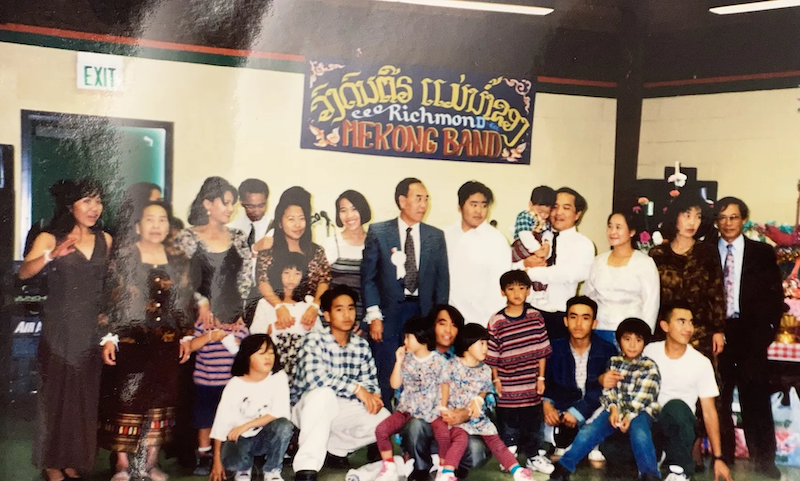
Chanh and Manh’s family pose together for a photograph in Richmond, California. Chanh stands second to top right; her brother Manh stands closer to center, holding his son.
This May, APEN elders and youth will unveil a mural that pays tribute to Asian immigrant and refugee histories and futures in Contra Costa County. Ahead of the mural unveiling, we spoke to youth leaders Ashley and Alida Phuthama, their mom Vankham, aunt Chanh, and their uncle Manh about raising their families and fighting against refinery pollution as Laotian refugees. Throughout the conversations, the family would often help one another find the right words, adding to one another’s memories of an event. The following interview has been edited for length and clarity.
Home is where family is
Chanh Toommaly: What do I remember of Laos? I remember how green it was. There, you don’t have to pay for anything. You walked to your neighbor’s farm and asked to have some vegetables. Between the rows, we would plant squash, pumpkin leaf, hot pepper, egg-plant, and rotate through. When one family had chickens, or a water buffalo, they were shared. When one household had meat, everyone ate. Nobody went hungry. If we went out into the forest, we came back with the food. Sometimes around dinner — your brother or uncle would make the fire, and say, “Wait for me, I’ll be back,” and he’d go out and come back with fish or a bird.
Manh Phongboupha, Chanh’s younger brother: Of course, it is different now. After the war. Now there are markets everywhere, and you have to buy the food.
Chanh: Before, it was free.
Manh: Before the war and the rise of the Pathet Lao in ’75 I studied Law and Administration. In school, I was — maybe I was the teacher’s helper. I would go up to the blackboard and write down answers. I felt respected, that people liked me, even though I was shy.
As young people, we thought the new government would make change. We didn’t know better. But they sent so many people to camps, to be killed or punished. In 1975, they sent me to a re-education school in Mongolia. While I was away at the school, my family escaped Laos for America. My brother-in-law sent a letter that reached me just by chance. He wrote that my family was alive, and in America!
I was so afraid then that the administration would find out they’d gone, but from that moment I knew I wouldn’t return to Laos — that home for me was where my family was.
But I didn’t know about the pollution here. Or how hard it would be. We had to learn that later.
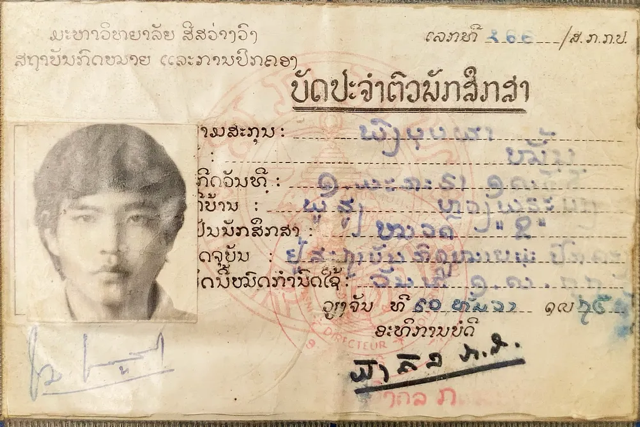
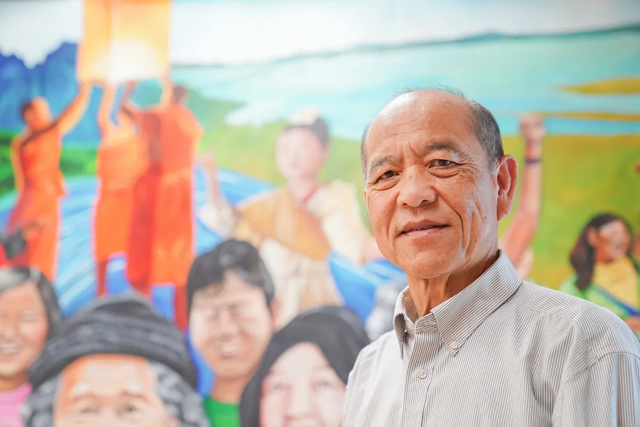
Left, Manh’s ID card from Laos in 1974. Right, Manh stands in front of the completed mural in the APEN office. Photo by Denny Khamphanthong.
Chanh: For us, we escaped by crossing the Mekong into Thailand. I remember it was in the early morning. We waited for three hours for just the right moment to cross. My son, who was five, went across first with his father.
I was so scared. I had my two daughters with me — they were ten and two years old. They didn’t cry, but I cried as we crossed over that water. My husband saw me crying and asked, “Did you have any problems?” And I said, no, no problems in particular — it was just all so scary, and overwhelming, and I was thinking of the faces of my family that I’d left behind me in Laos.
Vankham: Later, my sister sent someone for us to cross as well: my mom and I, my dad and my step-mom and her children. I was much younger — thirteen, and it was nighttime. We walked for a very long time, in the darkness. I remember carrying my younger sister to the river, to the boat that brought us into Thailand.
Chanh: The camps in Thailand were terrible, so crowded: we almost didn’t get in, but my husband spoke to the officer, who said: “OK — they can stay here, if they go back they would die.” Full of people, so hot and humid, with mosquitos that bit our legs. People sleeping everywhere, in the streets. We stayed in that refugee camp for three years.
Vankham: Me and my mom had our own place at the camp, where we stayed for a year before we moved to another camp — Soun Rungsit. So dirty, and so hot. We stayed there for a month before coming here. I was younger, so I started high school here in the U.S. We moved to Richmond from Albany, because the housing was cheaper, and because in Richmond they taught classes for people who had English as a second language.
That was me — I didn’t have any English — I was sitting in that El Cerrito classroom like, what am I doing here! [Laughs] Learning so slowly. But I took some accounting classes, and then my sister suggested that I be like her, and go to school for hair. Now I have my own shop.
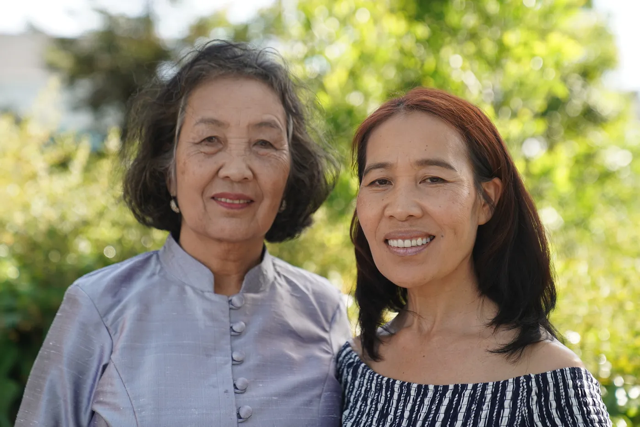
Sisters Chanh Toommaly (left) and Vankham Phuthama (right) stand outside the APEN office. Photo by Denny Khamphanthong.
Manh: The night I finally came to America, it was raining. The plane was supposed to land in San Francisco, where my family was waiting to pick me up. We circled, circled. It had been a long time since seeing my family and I hadn’t spoken my Khmu language for a long time that I forgot some things — it took me a few days to practice.
Vankham: Yes — I remember that!
Refinery towns
Manh: We thought America was the best place to make money or work. But we didn’t know about the pollution. My daughter — I had one daughter, who was born and grew up here in Richmond. She was 17 years old when she got diagnosed with brain cancer. Before, we thought that Richmond, America, would be the best place. But we didn’t know about the pollution. Suddenly she turns 17 and has this cancer. And although we went for radiation — eventually it came back. She passed away when she was 19.
Ashley: When I was a little kid, I even thought that Chevron was good, that they helped Richmond, because they fund different events. We ran in this marathon and I remember that our jerseys, and all of the signs all said Chevron. But then I realized that Chevron and other refineries are polluting across Contra Costa.
Finally there was this one time, in 9th grade, it was the end of the day and we were leaving school and the teachers stopped us. They said, “You can’t go outside. You can’t go home yet.” We couldn’t leave the building — the doors were locked. It turned out it was a refinery near our school that had exploded. There were parents waiting outside in their cars, just waiting to get their kids. There were huge clouds of smoke —
Alida: You couldn’t see anything. The drive home felt like hours. You couldn’t see outside the windows of the car. Other states get snow days, California gets fire days off.
Ashley: It was like a movie explosion. A huge fire, smoke billowing everywhere. So that’s when we realized how bad refineries are and can be. And now we’ve spoken out — even in Sacramento, at the state capitol.
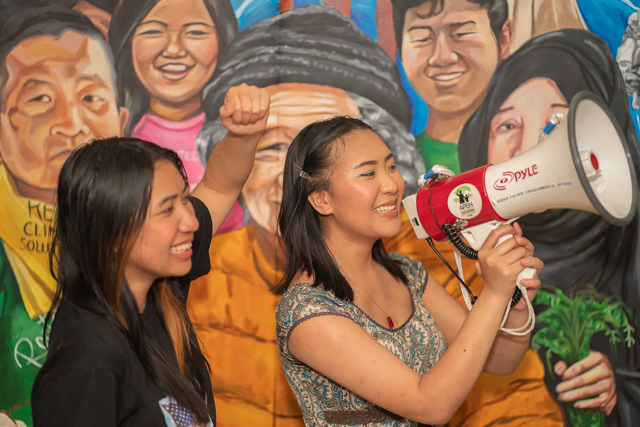
Ashley (left) and Alida Phuthama (right) hold a megaphone up in front of the newly painted mural. Photo by Denny Khamphanthong.
Chanh: But we hope to stay here. It’s our home and where we raised our families. One of my children was born right here, in Richmond. I’ve had my garden here. We want to continue to live here. We want it to be better, safe for our grandchildren.
We don’t know where else to go. We need the young people, the young women, to take over our organizations, to grow our community.
Blue waters, clean air
Ashley: We know that the Vietnam War is to blame for our family becoming refugees. But people, most people, don’t know that. The bombs dropped on our families, across Laos, by the U.S government made us refugees.
Alida: Growing up here in Richmond, we had lots of family around. Cousins, aunts, uncles — they either live here or work here or come back to visit. Because I was always around family, the first time I realized I was experiencing racism was in elementary school. I was quiet as a kid. There was this bully, who followed me around saying, “You’re Chinese?” And I’d say, “No, I’m from Laos.” And she’d make fun of me by saying, “You’re so LOUD!” Finally, I told her off.
Ashley: Kids didn’t know what Laos was, or anything about our history. There was another girl, who was white-passing but who had Filipina cousins, and she said that she was Asian, but she told me that I wasn’t. She didn’t know what Laos was. We said: We’re Asian too!
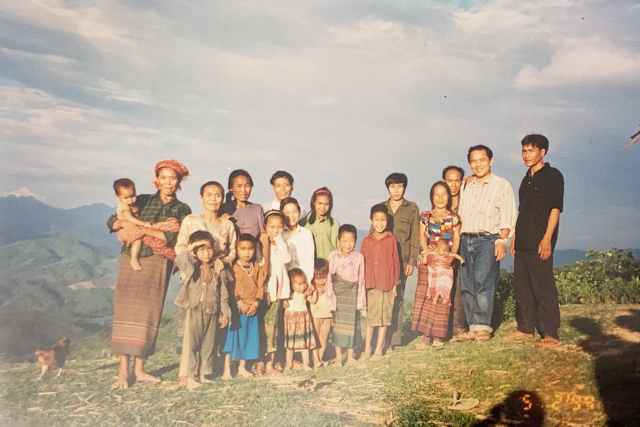
Manh visits family in Laos for the first time since leaving the country.
Alida: It’s twin power. Twin telepathy. We’d speak up for another all throughout school. I’d tell Ashley, you can’t let people walk all over you!
Ashley: She’d always stand up for me in school. I’d be the loud one, but I always wanted to be nice to everyone; she was the one who stood her ground.
Alida: When I was little, my mom always told me I was shy, like her. And when I was being shy, she used to tell me, “You can do whatever you want to. You can do everything.” And I’m trying to.
Ashley: For me, that’s what this mural represents: our hopes for one another. Elders and youth, across ages, sharing and supporting one another.
Our ancestors had to experience the war, and the struggles with migrating here, and now here in Richmond, decades of Chevron’s pollution.
But in the mural, you can see our vision for the future: there’s the blue waters, which are sort of the Mekong River that our elders crossed but in another way, the clean water we want here in Richmond, without the refinery. That’s what we fight for here at APEN: for clean air, water, and for people to have a safe environment.
And you can see that in the mural.
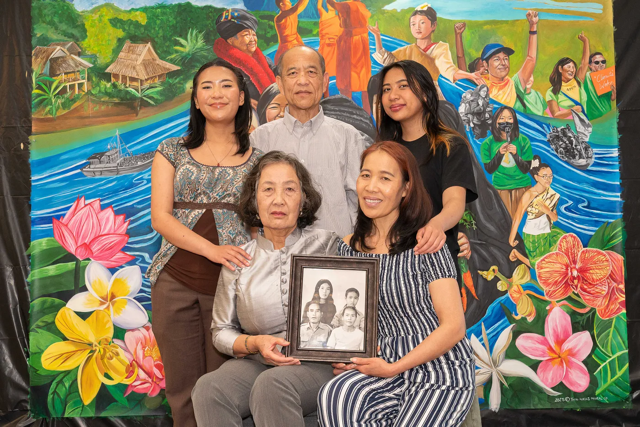
The mural “Flowers for Our Families,” will be on display at the Richmond Art Center on May 12. RSVP for the unveiling to hear APEN youth and elders present the mural in person.

